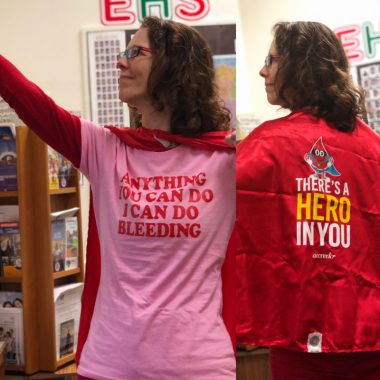What I Would Tell a Woman Struggling With Hemophilia
Written by |

As a woman with hemophilia who has a proper diagnosis and a fantastic treatment plan, I do not take my health for granted. I feel fortunate and blessed to have reached a place where coping with bleeds and pain is no longer a constant focus. I’m normal! (Well, as normal as someone as abnormal as me could feel.) I am healthy and strong. Some days, I don’t even feel like I have a bleeding disorder.
However, I took quite a journey to get to this point. I have some thoughts I would like to share with the women who are still on that journey.
You are not crazy
Contrary to the belief of some, this is not in your head. We know that women as a whole are more likely to be dismissed when seeking medical care. I have a theory that because women are expected to bleed every month, when women seek care for bleeding, it is further minimized because bleeding is something a woman is “supposed” to do.
Medical professionals who dismiss our concerns and symptoms can make us feel as though we are crazy. It is more likely that the medical professional is uninformed about bleeding issues.
Trust your intuition
You are the best expert on your body. If you know something is wrong or off, trust that instinct. Persist and continue to advocate for your care. If you are certain you are bleeding but are not believed, consider requesting imaging so that you have concrete, objective evidence regarding the injury you are experiencing.
Find your voice
Sometimes women are socialized to be sweet and to not question authority. Sometimes we learn to be seen and not heard, but you need and deserve to be heard! If you are not getting the diagnosis or treatment you need or deserve, be brave. Stand up and be counted. As you advocate for yourself, you are also advocating and laying the groundwork for future generations.

Find your voice, says columnist Shellye Horowitz. (Courtesy of Shellye Horowitz)
Surround yourself with people who support you
One of the most painful things I have experienced was when someone close to me doubted and even belittled me when I knew I needed treatment. There were moments when I was in strong pain, and a bleed was the likely culprit. I’ve been called a hypochondriac in difficult moments, which prompted me to avoid seeking needed medical care.
A friend provided fresh perspective on bleeding disorder support. Instead of belittling my pain, she would ask, “Do you need to treat? Should you call your hemophilia treatment center?” This encouragement to seek care was an important gift during my journey. I learned how much I minimized and ignored injuries that needed to be addressed.
In forming new relationships in the future, I would look for someone who encourages me to take care of myself and seek treatment when I need it.
Do your research
Learn as much as you can about your bleeding disorder. Women with hemophilia are still largely misunderstood, particularly by medical professionals who are not current with research about women with bleeding disorders.
I believe in burying doctors with research. If you can provide them with medical literature explaining your issues, it is hard to argue with, and it creates a different relationship.
About a year ago, I met a new doctor and gave him multiple scientific articles about my hemophilia mutation. He immediately responded, “You and your treatment center are the experts on you. What do you want or need me to know?”
There is hope, and it really does get better
It may take months or even years before your diagnosis and treatment plan are fine-tuned, but it does get better. Persevere, reach out for support, and hold on to hope. Many blood sisters have gone before you and paved the way to a better quality of life. With the collective wisdom of those who have walked the path before you, you, too, will find a glimmer of light to lead the way.
***
Note: Hemophilia News Today is strictly a news and information website about the disease. It does not provide medical advice, diagnosis, or treatment. This content is not intended to be a substitute for professional medical advice, diagnosis, or treatment. Always seek the advice of your physician or another qualified health provider with any questions you may have regarding a medical condition. Never disregard professional medical advice or delay in seeking it because of something you have read on this website. The opinions expressed in this column are not those of Hemophilia News Today or its parent company, Bionews, and are intended to spark discussion about issues pertaining to hemophilia.



Mary Jo Haugen
Loved this article Spot on!!!
Kathie R Johns
Thank you for this!All my life I have been dismissed as not having a bleeding problem!
My mom's dad & my own dad were bleeders but no a female couldn't possibly be one!
I am near 70 now & have finally found a hematologist who takes me seriously!
G Shellye Horowitz
I am so glad you finally found a hematologist who listens to you. It is my hope that our struggles will help ease the journey for those girls who come after us.